Dentures — Longmont, CO
You Deserve a Completed & Fully-Functional Set of Teeth
Have you experienced substantial tooth loss? You probably already know what dentures are, as they have long been a trusted solution for replacing a significant number of missing teeth. You may not be quite aware of how successful today’s dentures are, though. Now, thanks to modern methods and materials, dentures are more comfortable and natural-looking than ever before. Dental implants offer additional stability for a partial or complete denture. Keep reading to learn more about dentures form your Longmont, CO dentist and what you can expect from this restorative option.

Why Choose Longmont Complete Dentistry for Dentures?
- Full & Partial Dentures Available
- Can Restore Several or All Teeth on An Arch
- James Maurer Has Over 20 Years of Experience
Who’s a Good Candidate for Dentures?
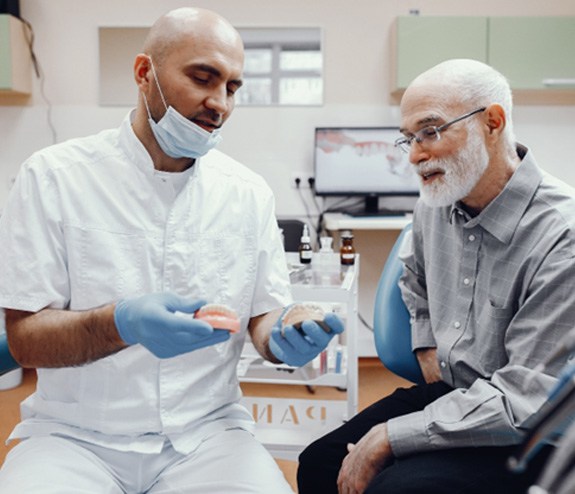
So long as you suffer from tooth loss, you’ll likely qualify for dentures. After all, these prosthetics don’t have overly-strict requirements. Still, you can only confirm your candidacy by consulting with our dentists. They’ll perform an oral exam to see whether dentures suit you. With approval, they’ll then devise a customized treatment plan for your smile. If you aren’t a good candidate, though, don’t despair; you could become one later with proper preparatory care. Just contact our office for details!
Effects of Missing Teeth

As you consider denture treatment, it’s crucial to know tooth loss causes and effects. Those details will help you see how the restorations can help.
In terms of causes, people lose teeth for various reasons. On the one hand, a tooth could decay so much that it falls out or needs extraction. Conversely, gum disease can wear down the bone and tissue holding teeth in place. Getting teeth knocked out from an accident or injury is possible as well.
Regardless of what prompts it, though, lacking teeth has consistently harsh effects. Without a full grin, everyday tasks – especially eating, speaking, and smiling – become more challenging. The condition also produces smile gaps that cause your jaw to erode. Left unchecked, this latter process could trigger facial collapse. Worse yet, the gaps could even result in further tooth loss.
What Qualifies You for Dentures?

As stated before, patients often qualify for dentures if they lack teeth. Even so, there are other factors you should keep in mind.
Take oral health, for instance. While dentures can replace already-missing teeth, they’re also good substitutes for sensitive or decaying ones. Plus, the appliance only works when the patient’s gum and jaw tissues are healthy enough. Otherwise, it’ll lack the support necessary to stay in place.
How many teeth you’ve lost also influences treatment. Depending on the number, you’ll need one of two possible denture models: partial or full. The partial type is best for replacing a few teeth. In contrast, full dentures are ideal when all pearly whites along an arch are gone.
Finances, too, play a role in your denture decision. The prosthetics, after all, are cheaper than alternative restorations. As such, they’re great for patients operating on a budget.
Alternative Tooth-Replacement Options
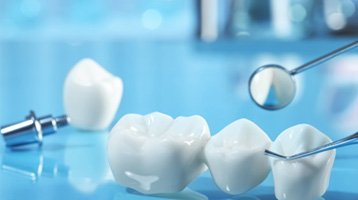
Even if you aren’t a good denture candidate, there’s still hope; our practice has additional replacement options. In particular, Longmont Complete Dentistry has two other procedures you could try. They include the following:
- Dental Bridges – As fixed restorations, dental bridges only replace a few teeth. Being made of crowns fused to a pontic, they need surrounding teeth to support themselves.
- Dental Implants – In contrast to dentures or bridges, dental implants are posts placed in your jaw’s sockets. Consequently, they gradually fuse with your jaw and stay pretty secure. However, these features mean they’re costly and require high jawbone density to work.
What Are the Different Types of Dentures?

There are a few different types of dentures, and the one that is right for you depends on the extent of your tooth loss and how healthy your jaw bone is. Dr. Maurer will consider three options to help you achieve the most effective tooth replacement for your unique smile.
- Partial dentures: Just like the name suggests, partial dentures are used when some healthy natural teeth still remain in the gum line. A removable one snaps into place using metal brackets affixed to the existing teeth. A partial denture will restore the natural form and function of the smile while also preventing the natural teeth from drifting out of place to fill in the gap.
- Complete dentures: For cases of total tooth loss in the upper or lower jaw, a complete denture can come to the rescue. Natural suction keeps the prosthetic in place. A denture adhesive may be used to provide additional security for a complete denture.
- Implant-retained dentures: Patients who are eligible for dental implants should strongly consider this option. Nothing provides more security than an implant denture. Prosthetic tooth roots are implanted beneath the gum line and grow together with the jaw over the course of 4 to 6 months. This sturdy foundation prevents slippage of the denture and renews your ability to eat, speak, and smile with total confidence.
How Dentures Are Made

Once you’ve decided that dentures are the best tooth replacement option for you, you may be wondering what the process looks like. Understanding how your dentures are made will help you appreciate your new smile that much more. Here is how the process works and what goes into your prosthesis.
What Are Dentures Made Of?

Dentures have two main parts – the base and the replacement teeth. Here’s what each one consists of:
- Denture Base: This is the structure that supports your replacement teeth. It can be made from a few different materials, like acrylic, nylon, porcelain, resin, or metal. Full dentures are usually made from acrylic because they can be crafted to match your natural gum tissue. Partial dentures may use metal clips with an acrylic base. In some cases, nylon is used in place of acrylic.
- Artificial Teeth: The artificial teeth are usually made from resin or porcelain because they both have a natural appearance. However, porcelain is usually the preferred option because of its durability and natural feel.
The Denture Creation Process

Every denture is customized. This requires a multi-step process. Here is what this typically looks like:
- Step 1: Your dentist will begin by taking impressions of your upper and lower gums using a thick paste. This is used to create a plaster model that acts as a replica of your mouth. This model is necessary to ensure that your final restoration is the perfect shape and size to fit in your mouth as it should. Your dentist will also take measurements of your jaw at this time.
- Step 2: The cast is sent to the dental laboratory where your dentures will be crafted. They will create a wax replica of your gum line.
- Step 3: The artificial teeth are set in place. A mechanical device, called an “articulator,” will be used to attach the teeth with wax. The lab technician will make minor adjustments by shaping and carving the wax to ensure that it looks like your gums.
- Step 4: The wax dentures are sent to your dentist for a fitting. If everything looks as it should, the dentures are sent back to the dental lab where the process will be completed.
- Step 5: Once they have been returned, the lab technician removes the wax portions. To do this, they will place your dentures into a flask, or a holding device. Plaster is poured in to hold the shape of the dentures. Then, the entire flask is placed in hot water to melt the wax.
- Step 6: After the wax is melted away, holes are made in the teeth so the material can attach to it. A liquid separator is added to the plaster layer to stop the acrylic from sticking to it. Acrylic is injected into the flask to replace the wax.
- Step 7: The plaster is carefully removed using lab tools to reveal the dentures. The dentures are then placed in an ultrasonic bath to remove any remaining plaster.
- Step 8: Excess acrylic is cut from the denture, and the denture is polished.
- Step 9: Once the process is complete, you can return to the practice for a fitting. Adjustments will be made if necessary.
Adjusting to Your New Dentures

Some mild soreness is normal when you first get new dentures. Over time, your mouth will adjust to them, and speaking and eating will come naturally. By sticking to soft foods, exercising your facial muscles, and practicing difficult sounds, you can speed up this adjustment process. If any discomfort persists, or you have any questions or concerns, don’t hesitate to let us know. We’re eager for you to enjoy your new smile!
Denture Maintenance Tips

The way you take care of your denture will also depend on if it is fixed or removable and whether or not it is retained by dental implants. Some key tips for long-lasting dentures are listed in brief below.
Dentures Aftercare
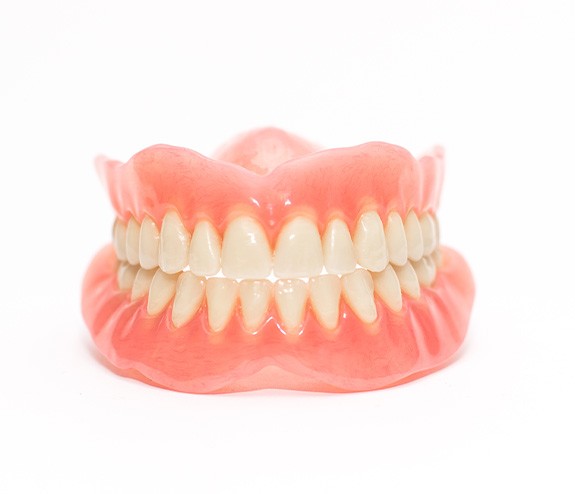
The way you take care of your denture will depend on whether it is fixed or removable and whether or not it is retained by dental implants. Some key tips for long-lasting dentures are listed in brief below. We invite you to review these suggestions and call us if you have any questions about caring for your dentures in Longmont.
Removable Dentures
Remove After Eating

When you’re finished eating, no matter the time of day, it’s important that you remember to remove your denture and give it a thorough cleaning. This will help to prevent bacterial accumulation as well as food debris from burrowing underneath your prosthetic and irritating your soft oral tissues.
Forgetting to do so or neglecting this step each time you finish eating will only increase your chances of gum disease and bacterial build-up.
Clean Your Restoration
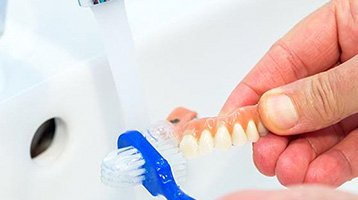
When it comes to cleaning your dentures, you’ll want to make sure that you brush the denture gently at least once a day using a denture cleanser or mild hand soap. Also, brush and floss your remaining natural teeth and gums after each meal, when you wake up, and before you go to bed.
Your gum tissues, existing natural teeth, and prosthetics need appropriate care to avoid serious problems and complications, so make sure that you are adhering to the instructions provided by our team at Longmont Complete Dentistry to keep your smile healthy.
Keep Your Dentures Safe

Your denture dentist understands that accidents can happen, but you’ll want to take precautions to avoid any damage to your dentures when possible. You can do this by placing a towel on hard surfaces so that when you place your clean denture on it, the soft barrier will prevent damage if it accidentally slips off of the counter.
You’ll also want to keep your dentures out of reach of small children and pets, as they can be mistaken for toys and be chewed up, stepped on, or thrown.
Remove Dentures When You Sleep

It is never a good idea to wear your dentures to bed, as it can cause your gums and bones to miss out on vital nutrients throughout the night. It can also increase your risk of pneumonia and leave your denture exposed to harmful bacteria. While you sleep, you should soak the denture in water or a denture solution. This allows your gums to rest and keeps the denture moist.
Notice Changes

It’s a good idea to visit your dentist as recommended for dental checkups and cleanings (every six months), and you should not hesitate to get in touch if you experience discomfort or slippage. A refitting may help. It might also be necessary to inquire about a replacement denture or if you are interested in making the switch to implant dentures.
All-On-4 Dentures

If you choose to restore your smile with All-On-4 dentures, you’ll need to follow some similar tips to keep your new smile looking and feeling its best. When it comes to cleaning your teeth, make sure to maintain good oral hygiene habits each day. This includes removing your implant denture to brush existing teeth, gums, and dental implants. While asleep, follow the same type of routine of soaking your denture throughout the night using a denture cleaner. You’ll also want to make sure that you contact us should you notice any changes or issues that may occur.
How Long Do Dentures Last?

When cared for properly, a traditional denture will typically last between five and seven years before a replacement is required. This is because the jaw bone will continue to shrink without the supportive root structure. You will know when it is time for a replacement because the denture won’t fit as well as it once did -- potentially causing oral sores and pain.
An implant denture will last for considerably longer than a traditional one, as dental implants promote oral health to prevent the degeneration of the jaw. While the denture will eventually need to be replaced due to natural wear and tear, you can expect it to stay functioning properly for years to come. The dental implants themselves will likely never need to be replaced. In some cases, an infection known as peri-implantitis can develop and lead to implant failure. Avoid this by keeping up with excellent hygiene habits and visiting the dentist regularly.
The Benefits of Dentures

Dentures remain one of the most popular and reliable solutions for replacing missing pearly whites. With modern technology, your prosthetics will be constructed to be durable, long-lasting, and as lifelike as possible. Not only will they improve your oral health, but you’ll be sure to enjoy a few boosts to your overall quality of life. Keep reading to learn several benefits of dentures and what to expect from your treatment.
Psychological Benefits

One of the most prominent psychological downsides to losing teeth is reduced self-confidence. With obvious gaps in your smile, you’re more likely to want to hide your mouth when talking or laughing. You may even be less willing to engage in social events because of your appearance. By replacing your teeth with dentures, you can feel much more relaxed and confident about showing off your fully rebuilt smile as well as reduce anxieties about things like your speech and chewing ability.
Clearer Enunciation

People typically need their teeth to speak clearly, as your tongue and lips tend to press against them for proper enunciation. Missing some or all of your pearly whites can make having conversations more difficult or embarrassing. With dentures, however, you’ll regain the necessary bite for proper speech. This will take some time, but a little practice every day will go a long way!
Improves Nutrition

Many foods that are healthy and nutritious can also be tough in texture, meaning they’re more difficult to chew. Without all of your teeth, this can make chewing your meals challenging and increase the risk of issues like malnutrition and indigestion. With dentures, you’ll be able to munch on your food more effectively, which can allow you to expand your diet. With more vitamin-rich and nutrient-dense options, you can also promote better oral and overall health in the long run.
Preserves Oral Health

Tooth loss can lead to jawbone deterioration, which can result in any other remaining natural teeth shifting out of place to fill the gaps. Dentures can help serve as placeholders, allowing your existing pearly whites to remain in place. Your prosthetics can also help bear some of the weight of chewing, preventing wear and tear of your natural teeth.
Expands Opportunities

In many cases, people will notice your smile first when meeting you. This can be extremely helpful during social interactions, especially for events like a job interview or a first date. If you want to make the best first impression possible, investing in dentures can be the game-changer you are looking for. Not only will you improve your bite and smile, but you’ll also be able to present yourself with confidence, which can boost your social and professional opportunities.
Understanding the Cost of Dentures

If you’re intrigued by the many benefits that dentures have to offer, you might be wondering what you’ll end up paying to rebuild your smile . Our team here at Longmont Complete Dentistry is happy to work with you to ensure that you fully understand the cost of dentures so that you’re able to maximize your benefits, lower your out-of-pocket expenses, and get your smile the restoration it needs! Keep reading below to learn more about what influences the cost of dentures or feel free to give us a call today for additional information or to schedule your consultation.
Factors That Affect the Cost of Dentures

Dentures are customized specifically for your unique smile, meaning that we can’t give you an exact cost estimate for your restoration until you visit us for a consultation. Upon doing so, our team will be able to examine your situation and give you an idea of what you’ll likely pay, so there aren’t any surprises when you get your bill. That said, the cost of dentures often depends on factors like:
- The severity of your tooth loss.
- The materials used in your restorations.
- Any necessary preliminary dental treatments such as periodontal therapy or tooth extractions.
Are Implant Dentures More Expensive?
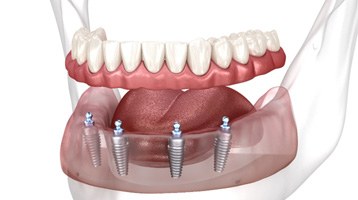
Generally speaking, implant dentures are more expensive than traditional ones; however, they’re well worth their higher cost. Implant dentures are different from standard ones in that they’re surgically embedded into your jawbone with the assistance of dental implants. Not only do these implants secure your dentures, but they also provide various oral health benefits including jawbone stimulation and facial support. They can also last for several decades with proper care, making them an incredibly cost-effective restoration option.
Does Dental Insurance Cover Dentures?

Dentures are often deemed as essential for restoring and preserving your oral health, meaning that many insurance providers can cover at least a portion of the cost (usually around 50%). However, since the details of every plan differ it’s important to double-check your coverage before committing to treatment. We’d be happy to assist you with navigating the details of your insurance plan to ensure that you’re making the most of your benefits and minimizing your out-of-pocket costs.
Other Options for Making Dentures Affordable
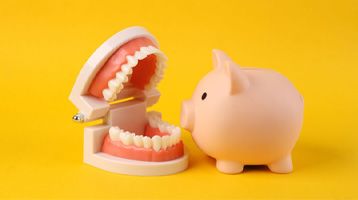
Even if you don’t have dental insurance, you aren’t entirely out of luck when it comes to making dentures more affordable. We’re happy to offer financing through CareCredit that will allow you to pay for your care at a manageable rate. Don’t hesitate to reach out to our team today so that we can discuss your options and figure out the financial aspects of your treatment.
Denture Frequntly Asked Questions
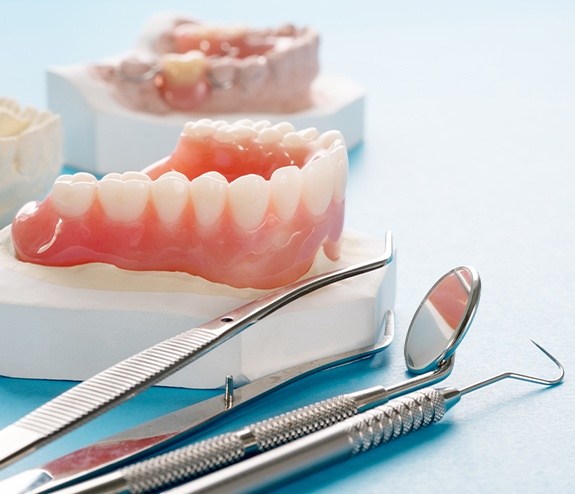
Dentures in Longmont are a classic way to quickly and easily restore your complete smile and improve your quality of life! Replacing your missing teeth is a big decision, and we want you to feel 100% confident in whatever choice you make. Below, you’ll find some common questions we get about full and partial dentures. If you don’t see the answer you’re looking for, don’t hesitate to give us a call or schedule your consultation!
I am interested in dentures—where do I start?
The first step on your way to a complete set of pearly whites is to come see us for a consultation. During this initial appointment, we’ll have a discussion about your tooth replacement goals and address any of your concerns. Then, we’ll carefully inspect your mouth and review your medical history. If dentures are a good choice for you, we’ll fully explain your options and our recommendations. If your oral health needs to be improved before you can be considered a candidate, we’ll make a treatment plan to get you on track for your brand-new smile.
Can I clean dentures with a regular toothbrush and toothpaste?
While it’s essential that you keep your dentures clean, it’s just as important that you use the right tools and products while doing so! Your regular toothbrush and toothpaste are too abrasive to use on your dentures. Over time, they can scratch away the finish, which would weaken and dim your dentures. Always use special denture brushes and cleaning solutions to keep your new smile sparkling, healthy, and strong.
Am I a candidate for implant-retained dentures?
Implant-retained dentures replace missing teeth both above and below the gumline. This unique treatment is a great choice for those who:
- Are in good overall health: Placing dental implants is a surgical procedure, so you’ll need to be healthy enough to undergo minor surgery.
- Maintain great oral health: Issues like plaque buildup, tooth decay, and gum disease can damage the tissues that help hold your dental implant in place and cause it to fail, so they’ll need to be addressed first.
- Have adequate jawbone density: For your implant-retained dentures to be successful, you’ll need to have enough jawbone density for them to fuse with. Thankfully, many times we can use all-on-4 dental implants to replace an entire arch of missing teeth in weaker jawbones.
Does dental insurance cover the cost of dentures?
Every dental insurance policy is slightly different, so you’ll need to look over the details of your specific plan to see what your insurance company is willing to cover. Generally, dental insurance will cover at least a portion of the cost of dentures, but we’ll be happy to review your policy and help you maximize your benefits. If you don’t have insurance or if your policy doesn’t cover all or any of your treatment, we offer financing options through CareCredit. These plans will help break down the cost of your dentures into payments that easily fit into your monthly budget. During your consultation, we’ll discuss all your options for making your new smile as affordable as possible!
Contact Us Today
If you have sustained significant tooth loss, don’t hesitate to get in touch with our dental office to discuss what is possible with full, partial, or implant-retained dentures. These options offer a natural-looking solution for significant tooth loss. Go ahead and request an appointment at Longmont Family Dentistry today!
